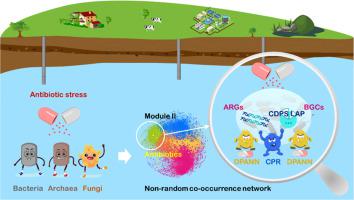当前位置:
X-MOL 学术
›
Water Res.
›
论文详情
Our official English website, www.x-mol.net, welcomes your
feedback! (Note: you will need to create a separate account there.)
CPR bacteria and DPANN archaea play pivotal roles in response of microbial community to antibiotic stress in groundwater
Water Research ( IF 11.4 ) Pub Date : 2024-01-13 , DOI: 10.1016/j.watres.2024.121137 Moran Tang 1 , Qian Chen 1 , Haohui Zhong 1 , Shufeng Liu 2 , Weiling Sun 1
Water Research ( IF 11.4 ) Pub Date : 2024-01-13 , DOI: 10.1016/j.watres.2024.121137 Moran Tang 1 , Qian Chen 1 , Haohui Zhong 1 , Shufeng Liu 2 , Weiling Sun 1
Affiliation

|
The accumulation of antibiotics in the natural environment can disrupt microbial population dynamics. However, our understanding of how microbial communities adapt to the antibiotic stress in groundwater ecosystems remains limited. By recovering 2675 metagenome-assembled genomes (MAGs) from 66 groundwater samples, we explored the effect of antibiotics on bacterial, archaeal, and fungal communities, and revealed the pivotal microbes and their mechanisms in coping with antibiotic stress. The results indicated that antibiotics had the most significant influence on bacterial and archaeal communities, while the impact on the fungal community was minimal. Analysis of co-occurrence networks between antibiotics and microbes revealed the critical roles of Candidate Phyla Radiation (CPR) bacteria and DPANN archaea, two representative microbial groups in groundwater ecosystem, in coping with antibiotic resistance and enhancing network connectivity and complexity. Further genomic analysis demonstrated that CPR bacteria carried approximately 6 % of the identified antibiotic resistance genes (ARGs), indicating their potential to withstand antibiotics on their own. Meanwhile, the genomes of CPR bacteria and DPANN archaea were found to encode diverse biosynthetic gene clusters (BGCs) responsible for producing antimicrobial metabolites, which could not only assist CPR and DPANN organisms but also benefit the surrounding microbes in combating antibiotic stress. These findings underscore the significant impact of antibiotics on prokaryotic microbial communities in groundwater, and highlight the importance of CPR bacteria and DPANN archaea in enhancing the overall resilience and functionality of the microbial community in the face of antibiotic stress.
中文翻译:

CPR细菌和DPANN古菌在微生物群落对地下水抗生素胁迫的响应中发挥关键作用
自然环境中抗生素的积累会破坏微生物种群动态。然而,我们对微生物群落如何适应地下水生态系统中抗生素胁迫的了解仍然有限。通过从 66 个地下水样本中恢复 2675 个宏基因组组装基因组 (MAG),我们探索了抗生素对细菌、古菌和真菌群落的影响,并揭示了关键微生物及其应对抗生素胁迫的机制。结果表明,抗生素对细菌和古菌群落的影响最显着,而对真菌群落的影响最小。对抗生素和微生物之间共现网络的分析揭示了候选门辐射(CPR)细菌和DPANN古菌(地下水生态系统中的两个代表性微生物群)在应对抗生素耐药性和增强网络连通性和复杂性方面的关键作用。进一步的基因组分析表明,CPR 细菌携带约 6% 已确定的抗生素抗性基因 (ARG),这表明它们具有单独抵抗抗生素的潜力。同时,CPR细菌和DPANN古菌的基因组被发现编码负责产生抗菌代谢物的多种生物合成基因簇(BGC),这不仅可以帮助CPR和DPANN生物体,而且有利于周围微生物对抗抗生素应激。这些发现强调了抗生素对地下水中原核微生物群落的重大影响,并强调了 CPR 细菌和 DPANN 古菌在增强微生物群落面对抗生素胁迫时的整体恢复力和功能方面的重要性。
更新日期:2024-01-13
中文翻译:

CPR细菌和DPANN古菌在微生物群落对地下水抗生素胁迫的响应中发挥关键作用
自然环境中抗生素的积累会破坏微生物种群动态。然而,我们对微生物群落如何适应地下水生态系统中抗生素胁迫的了解仍然有限。通过从 66 个地下水样本中恢复 2675 个宏基因组组装基因组 (MAG),我们探索了抗生素对细菌、古菌和真菌群落的影响,并揭示了关键微生物及其应对抗生素胁迫的机制。结果表明,抗生素对细菌和古菌群落的影响最显着,而对真菌群落的影响最小。对抗生素和微生物之间共现网络的分析揭示了候选门辐射(CPR)细菌和DPANN古菌(地下水生态系统中的两个代表性微生物群)在应对抗生素耐药性和增强网络连通性和复杂性方面的关键作用。进一步的基因组分析表明,CPR 细菌携带约 6% 已确定的抗生素抗性基因 (ARG),这表明它们具有单独抵抗抗生素的潜力。同时,CPR细菌和DPANN古菌的基因组被发现编码负责产生抗菌代谢物的多种生物合成基因簇(BGC),这不仅可以帮助CPR和DPANN生物体,而且有利于周围微生物对抗抗生素应激。这些发现强调了抗生素对地下水中原核微生物群落的重大影响,并强调了 CPR 细菌和 DPANN 古菌在增强微生物群落面对抗生素胁迫时的整体恢复力和功能方面的重要性。





















































 京公网安备 11010802027423号
京公网安备 11010802027423号